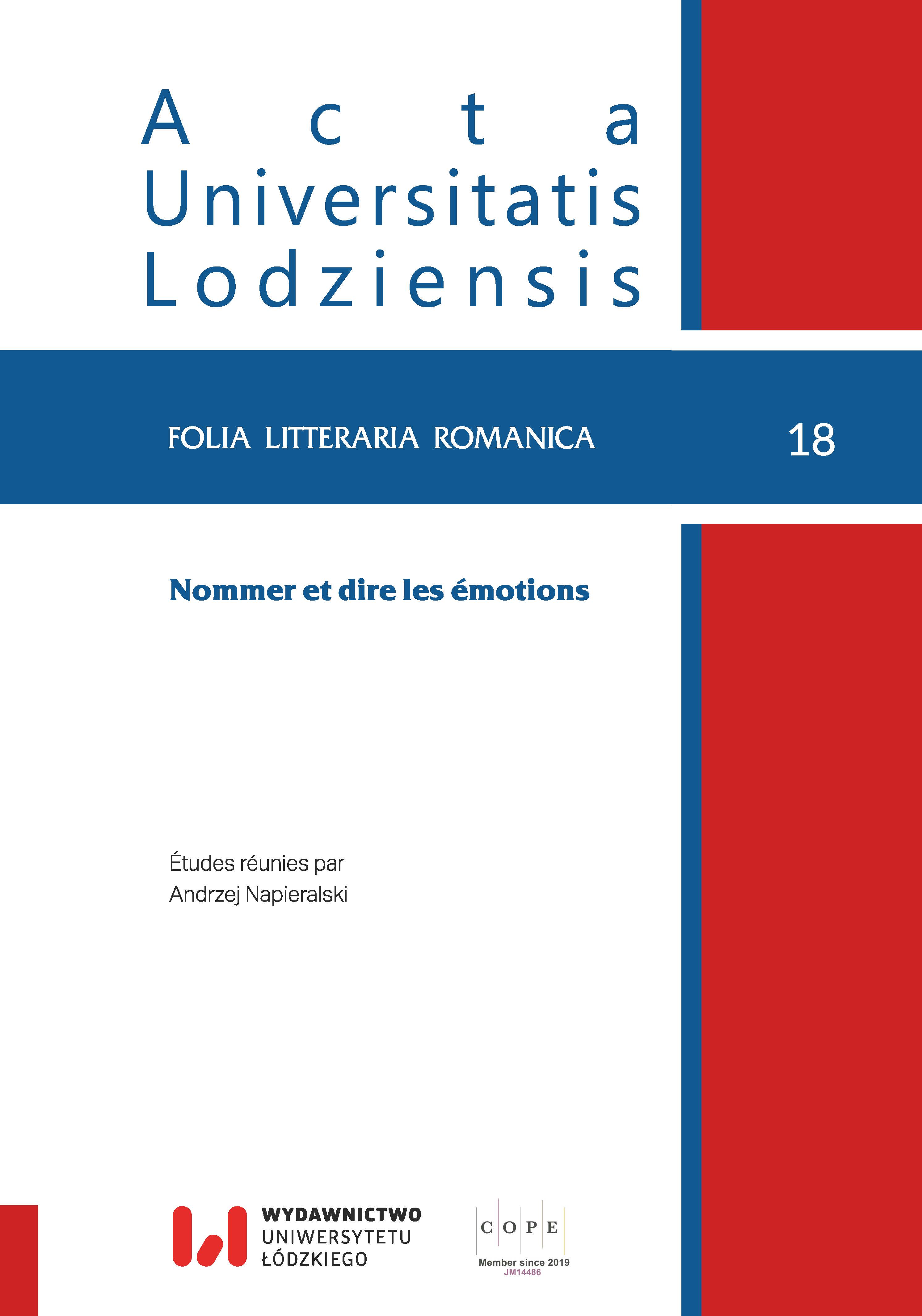The Role of Prosodic Factors in French and Polish Anti-Semitic Discourse: Mere Emotional Expressions or Genuine Arguments?
DOI:
https://doi.org/10.18778/1505-9065.18.06Keywords:
prosody, argumentation, written interactive register, antisemitismAbstract
The article presents, in a synthetic way, some observations of the author on the functioning of the prosodic elements in the discourse on Jewish issues which, very often, degenerates into anti-Semitic discourse. The corpus consists of discursive contributions drawn from authentic Internet interactions, focusing on Dieudonné’s activities in France from 2009 and on Rafal Betlejewski’s performances in Poland from 2007. Since this speech is carried out in the written interactive register, it is a graphic imitation of prosody. Examples of the equivalents of marked pronunciation, accent on the topic of the utterance, and puns residing on homonymy are analysed. The author argues that such imitations, apart from the expression of emotions, also lead to argumentative effects. The article provides a synthetic overview of these observations, highlighting the role of prosodic elements in shaping discourse on Jewish issues.
Downloads
References
AMOSSY, Ruth (2006), L’argumentation dans le discours, Paris, Armand Colin
Google Scholar
AMOSSY, Ruth (2008), « Dimension rationnelle et dimension affective de l’ethos » in Émotions et discours (M. Rinn, éd.), Rennes, Presses universitaires de Rennes
Google Scholar
BETLEJEWSKI, Rafał (2014), « I miss you, Jew! », Open Arts Journal, Issue 3, p. 165-172 (https://doi.org/10.5456/issn.2050-3679/2014s31rb)
Google Scholar
DOI: https://doi.org/10.5456/issn.2050-3679/2014s31rb
BLACKER, Uilleam (2014), « Spatial dialogues and Holocaust memory in contemporary Polish art : Yael Bartana, Rafał Betlejewski and Joanna Rajkowska ». Open Arts Journal, Issue 3, p. 173-187. (https://doi.org/10.5456/issn.2050-3679/2014s32ub)
Google Scholar
DOI: https://doi.org/10.5456/issn.2050-3679/2014s32ub
CALABRESE STEIMBERG, Laura (2009), « Nom propre et dénomination évènementielle : quelles différences en langue et en discours ? », Corela, 7.1 (https://doi.org/10.4000/corela.173)
Google Scholar
DOI: https://doi.org/10.4000/corela.173
CHWIEJDA, Ewelina (2017), « Juif, tu me manques ! : La culture polonaise contemporaine face aux relations entre Juifs et non-Juifs dans la Pologne de l’après-guerre », Juifs d’Europe : Identités plurielles et mixité, Tours, Presses universitaires François-Rabelais. (http://dx.doi.org/10.4000/books.pufr.16144)
Google Scholar
DOI: https://doi.org/10.4000/books.pufr.16144
DYONIZIAK, Jolanta (2012), « Expressivité du discours de la presse », Studia Romanica Posnaniensia, no 39/4, p. 19-30. (https://doi.org/10.14746/strop.2012.394.002)
Google Scholar
DOI: https://doi.org/10.14746/strop.2012.394.002
GUYADER, Antonin (2014), « Dieudonné, quelle est la question ? », Pouvoirs, no 2(2), p. 169-177. (https://doi.org/10.3917/pouv.149.0169)
Google Scholar
DOI: https://doi.org/10.3917/pouv.149.0169
KEARNEY, Richard (2001), « Chapitre V. L’Autre et l’Étranger : entre Derrida et Ricoeur », Philosopher en français. Langue de la philosophie et langue nationale (J.-F. Mattéi éd.). (http://dx.doi.org/10.3917/puf.matte.2001.02.0095)
Google Scholar
DOI: https://doi.org/10.3917/puf.matte.2001.02.0095
MAGNENOU, Fabien (2014), « Est-il encore possible de rire de tout ? », in Archives de France TV Info
Google Scholar
MARKOWSKA, Barbara (2013), « Jacy ‘my’ i jacy ‘oni’? Analiza semantyczna nazw i etykiet », in To oni są wszystkiemu winni... Język wrogości w polskim dyskursie publicznym, Warszawa, Wydawnictwo Trio
Google Scholar
MERTENS, Piet (2008), « Syntaxe, prosodie et structure informationnelle : une approche predictive pour l’analyse de l’intonation dans le discours », Travaux de linguistique, no 56, p. 97-124. (https://doi.org/10.3917/tl.056.0097)
Google Scholar
DOI: https://doi.org/10.3917/tl.056.0097
MOIRAND, Sophie (2007), Le discours de la presse quotidienne, Paris, PUF
Google Scholar
MOKRZAN, Michał (2016), « Antropologia retoryki: inspiracje Burke’owskie w amerykańskiej antropologii kulturowej », Zeszyty Etnologii Wrocławskiej, no 1(24), p. 127-148
Google Scholar
PIROGOWSKA, Ewa (2019) « L’image discursive de Juif en tant qu’ensemble sémiotique ». Studia Romanistica, Vol. 19/2, p. 29-40
Google Scholar
PIROGOWSKA, Ewa (2020), « L’image linguistique du Juif déjouée par les pragmatèmes. Le cas du discours antisémite et antisioniste », Neophilologica, Vol. 32, p. 146-156. (https://doi.org/10.31261/NEO.2020.32.08)
Google Scholar
DOI: https://doi.org/10.31261/NEO.2020.32.08
PIROGOWSKA, Ewa (2023), « Impact argumentatif du Npr dans le discours antisémite français et polonais: Étude de cas sur l’exemple de prénoms, toponymes, surnoms et sobriquets », Studia Neophilologica. (https://doi.org/10.1080/00393274.2022.2145492)
Google Scholar
DOI: https://doi.org/10.1080/00393274.2022.2145492
PLANTIN, Christian (1997), « L’argumentation dans l’émotion », Pratiques : linguistique, littérature, didactique, Vol. 96, p. 81-100. (https://doi.org/10.3406/prati.1997.2475)
Google Scholar
DOI: https://doi.org/10.3406/prati.1997.2475
REBOUL, Olivier (1991), Introduction à la rhétorique, Paris, PUF
Google Scholar
TAJFEL, Henri (Hersz, Mordche) (1974), « Social identity and intergroup behavior », Social Science Information, no 13(2), p. 65-93. (https://doi.org/10.1177/053901847401300204)
Google Scholar
DOI: https://doi.org/10.1177/053901847401300204
WIERZBICKA, Agnieszka (2015), « Żyd, Żydzi, Żydy, Żydki – stereotypes and judgments ingrained in the Polish language », Acta Universitatis Lodziensis. Folia Linguistica, no 49, p. 57-67. (https://doi.org/10.18778/0208-6077.49.05)
Google Scholar
DOI: https://doi.org/10.18778/0208-6077.49.05
Published
Versions
- 2023-10-30 (2)
- 2023-10-30 (1)
How to Cite
Issue
Section
License
Copyright (c) 2023 Ewa Pirogowska

This work is licensed under a Creative Commons Attribution-NonCommercial-NoDerivatives 4.0 International License.













